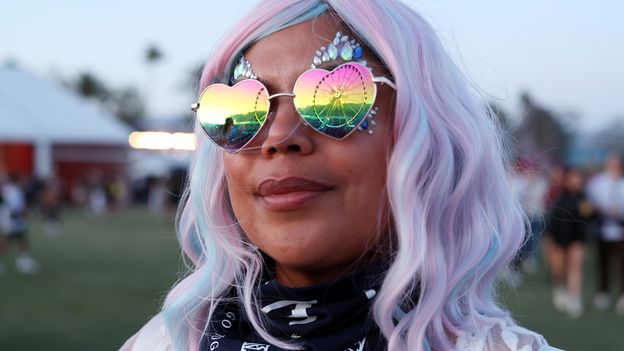All major music festivals face the same uphill struggle at a time when punters are feeling the pinch. Billboard reports that rivals including New York’s Governors Ball, which takes place in June, and Chicago’s Lollapalooza, which follows in August, also have tickets left. However, it is arguable that as the market leader, Coachella should have something of a head start. Editor and writer Courtney E Smith, author of Record Collecting for Girls, believes the California mega-festival is being impeded by “the slow decentralisation” of music. Because fans have access to more artists than ever before in the streaming era, traditional industry gatekeepers like radio stations and record labels hold less sway. For this reason, performers with truly universal appeal – the kind Coachella needs to guarantee a sell-out – are increasingly few and far between.
‘A transformational period’
This year’s headliners – Lana Del Rey, Tyler, the Creator and Doja Cat – are all massive names, but Smith believes they may not have captured the collective imagination to the same extent as previous superstar bookings. “There is no Lady Gaga, Beyoncé, Bad Bunny or Harry Styles this year,” she says. Programming an event of Coachella’s scale is an incredibly tricky, ever-shifting balancing act. In the past, Coachella has faced similar criticisms to many other music festivals – namely, that its line-ups are too white and male-dominated. Though there is still room for improvement in this regard, bookers have taken steps to improve the festival’s diversity in recent years. In 2018, Beyoncé became the first black female artist to headline; then the following year, Ariana Grande became only the fourth female headliner of any ethnicity since Coachella began in 1999. (At the time, the others were Lady Gaga and Björk, who did so twice.)
But because Coachella takes place early in the festival season, its bookers have always given themselves the extra challenge of “setting trends” on the live music scene. “The line-up always introduces the best of the year for the rest of the year,” Katy Perry opined in 2015, a view Smith broadly agrees with. “The bookers are known for bumping interesting acts to top spots and reuniting bands,” she says. But in this respect, their midas touch may be waning: last weekend’s much-hyped comeback performance from No Doubt – the band’s first in nine years – wasn’t greeted quite as rapturously as organisers might have hoped.
More like this:
When any Coachella line-up is unveiled, it becomes a talking point online. In 2017, the festival’s co-founder Paul Tollett caused raised eyebrows when he told The New Yorker that, hypothetically-speaking, he wouldn’t Book Kate Bush because “no one is going to understand it”. His failure to grasp the appeal of a highly influential and elusive alt-rock icon points to a wider problem. Launched by California-based concert promoters Goldenvoice in 1999, Coachella has always felt more corporate and less countercultural than other iconic festivals such as Nevada’s Burning Man and the UK’s Glastonbury. In 2017, Philip Anschutz, founder of The Anschutz Corporation, which owns the festival’s parent company AEG Live, dismissed as “fake news” reports that the foundation had donated to political groups with an anti-LGBTQ+ agenda. It contributed to a sense for some that, in marked contrast to some festivals, Coachella isn’t a place where you can “sock it to the man” – because it is the man.
Still, Daly believes any talk of “the death of Coachella” is “unwarranted”. Certainly, the fact this year’s festival is attracting so much attention suggests, at the very least, that it remains relevant and capable of recapturing its sparkle. For Daly, the key is for bookers to think carefully about what the Coachella crowd will look like in the coming years. “It feels like the audience could be going through something of a transformational period where one generation hands over the baton to a younger one,” she says. Daly notes that this year in particular, “dance-focused sets” from the likes of Peggy Gou and Justice have drawn “the most energy and enthusiasm” from festival-goers. In the meantime, there is no doubt that all eyes will be on the Empire Polo Club as Coachella 2024 begins its second weekend.
—
– videos and can’t-miss news delivered to your inbox every Friday.
For more Culture stories from the , follow us on Facebook, X and Instagram.


